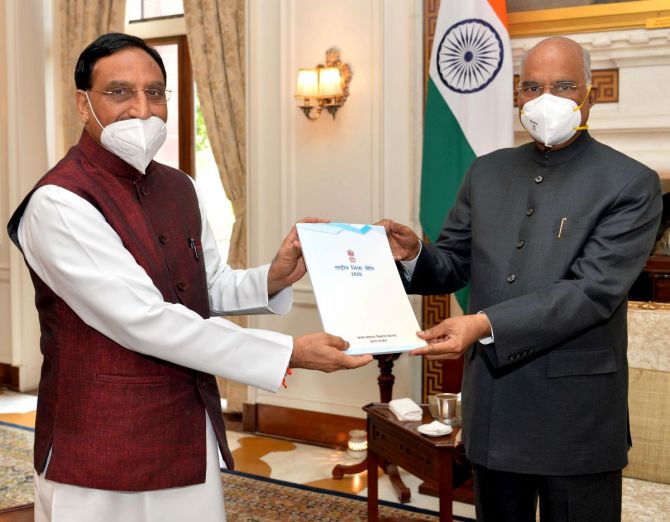The Delhi University on Tuesday approved the implementation of the National Education Policy (NEP) and four-year undergraduate programme at its executive council (EC) meeting.

Registrar Vikas Gupta said that the NEP will be implemented from the 2022-23 academic session. He said three members dissented against its implementation.
The implementation of the NEP and four-year undergraduate programme were approved by the Standing Committee on Academic Matters and the Academic Council last week.
The multiple entry/exit scheme (MEES), where students will be able to enter and exit the programme at various stages, and Academic Bank of Credit (ABC) were also approved in the meetings held last week.
The EC, which is the highest decision making body of the university, approved the MEES and ABC.
In a dissent note against the implementation of the policy, the members stated that it will lead to privatisation and commercialisation of education, and its implementation would lead to "destruction of the largest public funded university in India".
They also said that its implementation will dilute the learning and quality of education at the university.
The Delhi University Teachers' Association (DUTA) held an online protest on Tuesday against the implementation of the NEP.
At the meeting, the de-affiliation of College of Art from Delhi University and its affiliation with the city-government run Ambedkar University was also discussed.
The Delhi Cabinet in March took the decision to merge the College of Art, currently affiliated to Delhi University (DU), with Ambedkar University Delhi (AUD).
"A committee has been formed to look into the matter. The entire EC was not happy with the conduct of the Delhi government and it was decided to form a committee," Gupta said.
The university had earlier said it will establish facilitation centres in Roshanpura in Najafgarh and Bhati Kalan in Fatehpur Beri on the land given by the Delhi government.
The centres will save students residing in far-flung areas from a long commute to the university campus and will extend help in relation to examination and admission-related procedures.
The university also has plans to set up a college in Fatehpur Beri for which the names of first woman chief minister of Delhi Sushma Swaraj, Swami Vivekananda, Veer Savarkar and Sardar Patel were proposed.
In its meeting held on Tuesday last week, the academic council put forth five more names, including DU alumnus Arun Jaitley and former Prime Minister Atal Bihari Vajpayee.
"The council resolved that the name of these colleges/centres may be given after the names of Sushma Swaraj, Swami Vivekananda, Veer Savarkar, Sardar Patel. The council also suggested the names of Atal Bihari Vajpayee, Savitri Bai Phule, Arun Jaitley, Choudhary Brahm Prakash and CD Deshmukh. After general discussion/suggestions, the council resolved that the vice-chancellor be authorised to finalise the name," read the agenda of the meeting.
The discussion on the names was held and the EC proposed two more names -- Mahatma Gandhi and Amartya Sen. The VC will take a final call on the names, Gupta said.
The EC also approved the signing of the tripartite agreement between the education ministry, DU and UGC.
Two members expressed their dissent against it.
The tripartite memorandum of understanding (MoU) requires universities to continuously increase the internal (self-generated) financial resource through fee hike, shift to revenue earning commercial courses, engagement with other commercial activities and manage greater part of their research activities through extramural funding, according to university officials.
"We have been consistently opposing the tri-patrite MoU as an instrument to impose privatisation and contractualisation on DU. The original MoU signed was not shared in public and we have to follow the template sent by MoE every year," the note read.
"The draft MoU seems to be a PR document to appease the ministry and facts have not been presented. There is nothing in this document to show that how serious are the challenges on the front of funding and staffing. There is lack of clarity on how teacher and students ratio has been reached," it said.
"Secondly, it should be made specific that the new hostels will be started with the UGC and the government funding only. Higher Education Financing Agency (a joint venture company of a bank and the education ministry which provides financial assistance to educational institutions funding will make the things costly for students, especially SC, ST, OBC, EWS ones," according to the note.
They also claimed that there is a possibility of a fee hike which will have far-reaching consequences "in the public funded universities like DU, in which 60 per cent students come from SC, ST, OBC, EWS".
The EC also approved the proposal to appoint foreign scholars as adjunct facilities in departments.
EC member Seema Das dissented against the matter saying it will lead to reduction of workload of those working as ad-hoc faculty members and who are waiting to be regularised.
She also pointed out that the university has shortage of funds and the appointment of foreign faculty members would lead to increased burden.
A sexual harassment complaint by an ad-hoc teacher made against the then chemistry department head Professor Ramesh Chandra in 2017 was also discussed.











 © 2025
© 2025